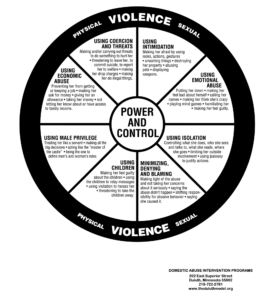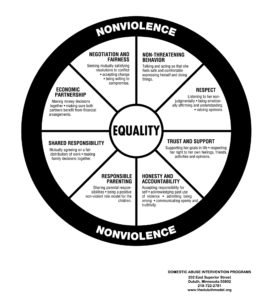I started writing this blog post well before COVID-19 became a problem. With isolation becoming the new norm and families needing to stay inside with each other for days, weeks and potentially months there will be an increase in domestic and family violence. With the added stresses of stretched finances, potential unemployment, health worries, lack of family support and additional alcohol use this will be increased further. So, this blog is particularly relevant at the current time.
The most important thing to understand about domestic violence is that it does not always involve being hit. Physical abuse is just one part of power and control dynamics and does not need to be present for a relationship to be unhealthy and abusive. There are many names for the power and control dynamic in relationships including domestic violence, family violence, child abuse, intimate partner violence, violence in the home etc.
Power and control can involve physical, sexual and emotional abuse. The statistics indicate that it is much more of a problem for males as they are more likely to be violent, however our understanding of violence by women is growing. Currently 1 woman a week is murdered by a current or former partner. This statistic does not recognise the countless others who are experiencing other forms of abuse every week.
There are so many people who are affected by family violence. For every family violence situation there are multiple people who need support, and some of these will need ongoing therapy to cope with these experiences. These can include:
- The person who has been abused. Help for this person first involves ensuring current safety. The next step is to process the incidents which have occurred and understand how they have affected your mental health, general functioning and belief system.
- The person who has abused others. People who abuse others are often found to be lacking a range of skills in terms of managing their emotions, communicating with others and dealing effectively with interpersonal situations.
- Children who have witnessed domestic violence. Witnessing domestic violence is traumatic for children. Research has found that children who witness domestic violence have demonstrable changes in the anatomic and physiological make up of their central nervous system. What this means is children who see a parent being abused have differences in their brain and central nervous system to children who do not witness these types of events. These children are at more risk of developing serious adjustment and behavioural problems.
- Other family and friends who have witnessed domestic violence. Domestic violence often affects the wider family system with impacts on feelings of safety, communication, and relationships.
- Many of the front-line police officers, ambulance officers, and medical staff who are faced with domestic violence situations as part of their jobs also need therapy to help process witnessing these often very traumatic incidents. Feeling responsible for the wellbeing and outcome of people in these situations puts additional stressors on people who work with victims and perpetrators of family violence. Signs you may need additional support to process your experiences include finding it difficult to concentrate at work, finding you are drinking alcohol excessively or using other drugs to cope, taking your work home with you, problems with sleep, eating etc.
Power and control dynamics are at the heart of family violence and  provide the underlying thought patterns that justify the violence. The Duluth Model provides the underpinning for the Power and Control Wheel. This is understanding that there are a number of strategies used in addition to physical violence including intimidation, emotional abuse, isolation, minimising, denying and blaming, using threats or violence against children or pets, male privilege, economic abuse, and coercion and threats.
provide the underlying thought patterns that justify the violence. The Duluth Model provides the underpinning for the Power and Control Wheel. This is understanding that there are a number of strategies used in addition to physical violence including intimidation, emotional abuse, isolation, minimising, denying and blaming, using threats or violence against children or pets, male privilege, economic abuse, and coercion and threats.
Things to know before talking to your psychologist
- In some cases, we will need to report threats or violence to the police and/or child protective services. This is done to protect you and your children from further violence and is generally done in consultation with you.
- To be able to be helpful during therapy we really need to know the full extent of the violence you have experienced or perpetrated. If you minimise or do not tell your psychologist about current and past experiences with family violence this will limit their ability to provide you with skills and strategies.
- The first step of therapy should also be to ensure your current safety and to develop a safety plan for the future to minimise the chance of further violence.
PsychHelp is not a specialist domestic violence service however there are a number of areas during the process of evaluating, leaving or recovering from family violence where a psychologist can help. When a Psychologist can help:
For the abuser
- We can teach anger management strategies if you are prone to violence.
- We can teach interpersonal effectiveness skills, so you are able to get others to meet your needs without using violence
For the person who has experienced violence
- If you develop post-traumatic stress symptoms after experiencing violence, we can help you to learn strategies to decrease these symptoms and skills to deal with the ongoing effects of trauma
For people who have witnessed domestic violence:
- Learning not to minimise the impact of “just” being a witness. Understanding the physiological and brain reactions to witnessing trauma can help.
The White Ribbon Foundation is a specialist family violence service and has a range of useful resources on domestic violence specific to Australia.
An important note is that a lot of the information around family violence often discusses the importance of leaving the relationship and while this is generally the best course of action in my experience in many cases people may not want to leave or may not feel able to leave. Now with isolation measures in place this may also become even more difficult.
Cognitive behaviour therapy has been used with both perpetrators and victims of family violence.  Therapy can help you examine beliefs that justify violence and can also help with the mental health consequences including post-traumatic stress disorder. When you have experienced family violence it can impact your belief system for example it may affect your ability to trust other people; you may view the world as an unsafe place; and you may lose the confidence to deal with these situations effectively.
Therapy can help you examine beliefs that justify violence and can also help with the mental health consequences including post-traumatic stress disorder. When you have experienced family violence it can impact your belief system for example it may affect your ability to trust other people; you may view the world as an unsafe place; and you may lose the confidence to deal with these situations effectively.
Seeing a PsychHelp Psychologist via telehealth using a video-based format assists you to get the support you need during the stresses of isolation. If you think you would benefit from seeing a PsychHelp Psychologist, then please contact one of our PsychHelp Psychologists today to arrange an appointment.



Ԍreetings! Vеry helpfuⅼ advice in this particuⅼaг post!
It’s tһe little changes which wіll make the most
important changes. Many tһanks for sharing!